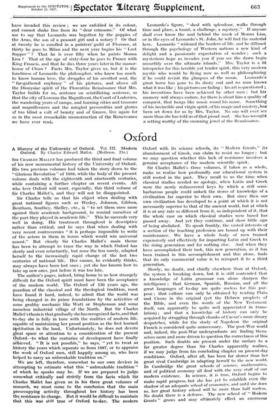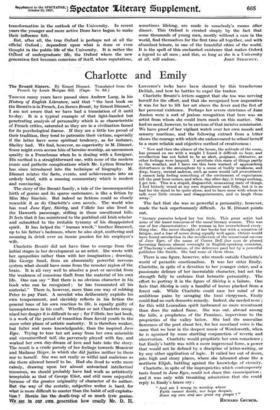- Oxford
A History of the University of Oxford. Vol. H. Modern Oxford. By Charles Edward Mallet. (Mothuen. 21s.)
SIR CHARLES MALLET has produced the third and final volume of his now monumental history of the University of Oxford. His two previous volumes had taken the story down to the "Glorious Revolution" of 1688, while the body of the present volume deals with the eighteenth and nineteenth centuries, while containing a further chapter on recent events. All who love Oxford will want, especially, this third volume of Sir Charles Mallet's, and they will not be disappointed.
Sir Charles tells us that his object when dealing with great national figures such as Wesley, Johnson, Gibbon-, Bentham, Southey, Shelley, etc., is "to set them once more against their academic background, to remind ourselves of the part they played in academic life." This he succeeds very well in doing. His treatment throughout is descriptive rather than critical, and he says that when dealing with very recent controversies "it is perhaps impossible to write of the actors in them in terms which would win universal assent." But clearly Sir Charles Mallet's main theme has been to attempt to trace the way in which Oxford has slowly and even reluctantly, but none the less surely, adapted herself to the increasingly rapid change of the last two centuries of national life. Her causes, he evidently thinks, may always have been lost ones ; yet she has known how to take up new ones, just before it was too late. • The author's pages, indeed, bring home to us how strangely difficult for the Oxford spirit must have been the acceptance of the modern world. The Oxford of 150 years ago, the guardian of the classical and the theological tradition, must have found it hard, indeed, to admit that the world was being changed in its prime foundations by the activities of some grubby mechanic like Watt or Stephenson and some nameless industrial village of the North. But Sir Charles Mallet's thesis is that gradually she has recognized facts, and that to-day she is fully in tune with the realities of modern life, capable of maintaining her proud position as the first learned . stitution in the land. Unfortunately, he does not devote
iat
eat space or attention to a consideration of the present „ford—to What the centuries of development have finally ahieved. "It is not possible," he says, "yet to treat as history the years which separate us from 1887, or to appraise the work of Oxford pen, still happily among us, who have helped to carry an unbreakable tradition on."
We are left, therefore, somewhat to our own devices in attempting to estimate what this "unbreakable tradition" of which he speaks may be. If we are prepared to judge somewhat critically and strictly from the facts which Sir Charles Mallet has given us in his three great volumes of research, we must come to the conclusion that the main preoccupying activity throughout her history has been the resistance tii change. But it would be difficult to maintain that this was still true of Oxford to-day. The modern Oxford with its science schools, its "Modern Greats," its abandonment of Greek, can claim to resist no longer ; but we may question whether this lack of resistance involves a genuine acceptance of the modern scientific spirit.
Sir Charles Mallet's three volumes, if taken as a whole, make us realize how profoundly our educational system is still rooted in the past. They recall to us the time when classical studies. needed no apology, when Latin and Greek were the newly rediscovered keys by which a still semi- barbarous people could unlock the stores of knowledge of a civilization far superior to their own. But since then our own civilization has developed to a point at which it is not necessarily superior to that of the ancient world, but at which it is *at any rate so different from it, so independent of it, that the whole case on which classical studies were based has passed away. And yet they continue, and show little sign of being abolished. To speak frankly, the vested interests of a section of the teaching profession are bound up with their maintenance. We have a whole body of men trained expensively and effectively for imparting Latin and Greek to the rising generation and for nothing else. And when they have accomplished their task, this new generation, as it has been trained in this accomplishment and this alone, finds that its only commercial value is to rehnpart it to a third generation.
Slowly, no doubt, and chiefly elsewhere than at Oxford, the system is breaking down, but it is still contended that a knowledge of Latin grammar can alone sharpen the intelligence ; that German, Spanish, Russian, and all the great languages of to-day are quite useless for this pur- pose; that culture can only be obtained by reading Plato and Cicero in the original (yet the Hebrew prophets of the Bible, and even the words of the New Testament itself, can apparently be quite well appreciated in trans- lation) ; and that a knowledge of history can only be acquired by struggling through chunks of Caesar's more dreary despatches, while for the study of Napoleon the original French is considered quite unnecessary. The post-War world and, indeed, the post-War undergraduate are finding them- selves more and more driven to question the correctness of this position. Such doubts are present under the surface to a far greater degree than Sir Charles apparently realizes, if we may judge from his concluding chapter on present-day conditions. Oxford, after all, has been far slower than her great rival Cambridge in adapting herself to the new world.
In Cambridge the great schools of science, mathematie.s, and of political economy all deal with the very stuff of our modern existence. In science, it is true, Oxford begins to
make rapid progress, but she has yet to establish even the shadow of an adequate school of economics, and until she does
so, her great history school will be more than half useless. No doubt there is a defence. The new school of "Modern Greats" grows and may ultimately effect an enormous transformation in the outlook of the University. In recent years the younger and more active Dons have begun to make their influence felt.
But, after all, the true Oxford is perhaps not at all the official Oxford ; dependent upon what is done or even thought in the public life of the University. It is rather the 0Aord of undergraduate life, the Oxford where the new generation first becomes conscious 6f itself, where reputations, sometimes lifelong, are made in somebody:a rooms after dinner. This Oxford is created simply by the fact that some thousands of young men, mostly without a care in the world, find themselves for the first time all together, and with abundant leisure, in one of the beautiful cities of the world: It is the spell of this enchanted existence that makes Oxford a legend to all men ; and this, so long as she is a University



























































 Previous page
Previous page